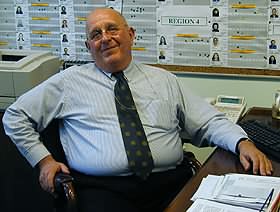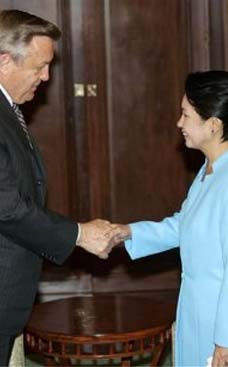
He describes himself as a young man, fresh from studies at a German university who wanted the Peace Corps to send him to a remote place, a place where he could learn a new language that was not somehow European-based or influenced. He describes a long horse ride and swimming across five rivers to reach his destination, a village of 200 people where no one spoke English. A place without electricity or any modern conveniences and where he possessed the only radio. For his time there he, with only a rudimentary knowledge of the language, other than customary greetings (I took this to mean by that as we say in my South, "He only knew his 'please's and 'thank you's.") and was to teach English and math in Sesotho. He had to learn the language on the job and through living with the people. And he tells of trouble. A coup d�e�tat where the children hid and the native teachers were all taken away. He wound up teaching all the school's courses that year except Sesotho and the religious studies course. A 54 hour-per-week teaching schedule became his task during turbulent times.
PCOL Comment: Since this story was published, Karl Beck has moved on the the Philippines where he was Peace Corps Country Director during the search for Peace Corps Volunteer Julia Campbell.
Ukraine Peace Corps Country Director Karl Beck served as a PCV in Lesotho
Karl Beck: Peace Corps Director, Ukraine
by Glen WILLARD
The two canaries in his office make considerable noise at times. Their names are Clinton and Monica. Being an American, his principal language is English, though he is equally at home conversing in Sesotho. He speaks fluent German and French as well, and can get by in Spanish and at least two Bantu languages. He calls both Africa and the US home. His boyhood home is Ft. Myers, Florida. All but six of his adult years have been spent abroad. He began his career as a Peace Corps volunteer in a remote village in a remote section of Lesotho. Most of his professional life has been with the U.S. State department on foreign service-type appointments, though not as a foreign service officer. He has five children by an African wife to whom he was married for 18 years. The children have dual U.S. and South African citizenship. A hobby is collecting African art and he is a student of history and an avid reader. Among other things, he has been a teacher, a professor, a civil servant and a diplomat. The Peace Corps was a beginning, a kind of middle and is now. And there is more.
I met Karl Beck in his offices on May 17. Our mid-morning interview began at 11:00 and continued for about two very interesting hours. For Karl is a most interesting personality, a man in his late 50s who seems to be enjoying life in Kyiv. His career has been distinguished, varied, and his record one of accomplishment. And as one might apprise from above, interesting.
I don't know, but sense, that Lesotho was an important factor in Karl's commitment to service in a long career dedicated to humanitarian causes. This notwithstanding that much of his life has been spent in African countries. Pleasure and emotion surface as he relives those early memories. He tells of the early history of the country. He pencils a map showing this geographically challenged interviewer how the country is set in the south and east lower portion of the African continent and surrounded by the hugeness of the South African nation. He informs me as to how the country became an English protectorate but was never a crown colony. And also that it was never a part of South Africa so as to become a "home" country and thus never a part of that country's apartheid regime. On the pencil map that he draws for me, he spells out Lesotho as well as the language, Sesotho, and the name of the people, the Basotho as he describes the French (who, early-on, sent missionaries to the spot) influence on the spellings.
Further, he describes himself as a young man, fresh from studies at a German university who wanted the Peace Corps to send him to a remote place, a place where he could learn a new language that was not somehow European-based or influenced.
He describes a long horse ride and swimming across five rivers to reach his destination, a village of 200 people where no one spoke English. A place without electricity or any modern conveniences and where he possessed the only radio. For his time there he, with only a rudimentary knowledge of the language, other than customary greetings (I took this to mean by that as we say in my South, "He only knew his 'please's and 'thank you's.") and was to teach English and math in Sesotho. He had to learn the language on the job and through living with the people.
And he tells of trouble. A coup d�e�tat where the children hid and the native teachers were all taken away. He wound up teaching all the school's courses that year except Sesotho and the religious studies course. A 54 hour-per-week teaching schedule became his task during turbulent times.
Lesoto was only a beginning to Karl's African experiences. Later civil service positions or Peace Corps-related missions were carried out in South Africa and in West and Central Africa over a number of years.
In addition to Africa, Karl has held positions in Germany and Switzerland, worked in the States at times, in and out of Washington D.C., as well as held a visiting professorship at Duke University. At Duke he was Visiting Professor in International Relations.
Following the Rwanda War he worked with the United Nations Assistance Program. He has been involved in migration issues and with resettlement problems. Being in South Africa in the days immediately preceding the termination of apartheid is a part of his experience.
In discussing and asking about the end of apartheid an interesting exchange occurred as he related his experiences of those times. The coincidence in timing of the end of apartheid, the fall of the Berlin Wall and independence for the former Soviet republics proved interesting. (Note: Quite naturally, Karl happened to be serving in a position in the area when the Wall came down and wound up working on resettlement and other issues.)
Karl saw interesting parallels in the gaining of independence in one case and freedom from apartheid in the other. The number of poor and low-income people, the unemployment, the new opportunities that needed to be grasped and the work needed done were discussed. The parallel broke down, however, when education was considered. Ukraine and the other former Soviet republics were noted to be constituted of masses of well-educated people, while those the target of apartheid in South Africa had no such advantage.
The foregoing is but little of our conversation. Interestingly, it did lead us both into reminisce of memories of the American South of the early 60s and the rather amazing changes that have occurred over the past 40 years. Perhaps it takes two who saw and lived in and grew up in the South in the 50s and came of age in the 60s to fully appreciate those changes. Those changes, even with the problems that still exist today, brought progress and economic opportunity for those in the South. The changes brought development and new people and led to much migratory as well as internal progress and growth. Perhaps, lessons of hope for the former Soviet peoples and those of South Africa, too.
Ukraine
Karl Beck says he's enjoying his time in Ukraine. In his position as director of the Peace Corps he travels the length and breath of the country. He says he has seen much change in the three-plus years he has been here. He sees Ukrainians as having developed more confidence in themselves.
I commented on the people seeming to have apathy to participating in government and possibly not being as engaged in citizenship matters as they could be. Karl had a quick response, as he disagreed. After first making the necessary statement about politics not being a function of the Peace Corps and his conscious lack of interest in such he made some comments I found interesting.
On citizenship. As I said, he travels. He is extremely impressed with the Ukrainian educational system and its health. He's visited hundreds of schools. He sees schools in good repair, well maintained, clean. He sees dedicated teachers and children who are staying in school and are learning. He sees computers in many schools. He pointed to a program where 10,000 computers are going to schools, about half to rural schools. The program involves Intel and the Education Ministry.
He believes citizenship is about communities being active, good schools, involvement in orphanages, activities for children, concern about drug and other substance abuse (including alcohol and cigarettes). Those things are the makeup of good citizenship. And he sees that to be a reality throughout Ukraine.
Peace Corps
I ask about the relevance of the Peace Corps today. Needless to say, this gave Karl his opportunity to converse on a favorite topic. And he did so like only a good director (and diplomat ) could. And the overall answer is obviously an enthusiastic affirmative.
He reminds that Ukraine did not ask for the Peace Corps. That the Peace Corps did not come to Ukraine to educate Ukrainians. Ukrainians are already well-educated. But, the Peace Corps can give confidence to Ukrainians in many areas by bringing pragmatic thinking to problem-solving. This is an area he feels the Peace Corps has a very definite function in a country newly facing a more open and competitive world. And in this, Karl gave many examples. I wish the space for this article gave room for me to cite a few of the situations Peace Corps people have been responsive. Karl was obviously quite proud.
The Peace Corps is poised to soon have close to 300 people working in Ukraine. I asked why so many. Quickly, Karl pointed out that relative to Ukraine's large population, this was few compared to some other countries. Also, a fact that surprised me: Many older people are making great contributions to Peace Corps projects by bringing learned experiences to bear on problem-solving and teaching.
The time was too short with Karl and I hope to have the opportunity to talk with him again. And have more space.
Those canaries. Clinton and Monica. A good story for another time. But, don't think a bad one. Nothing disrespectful to the former President.



















